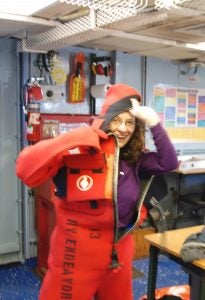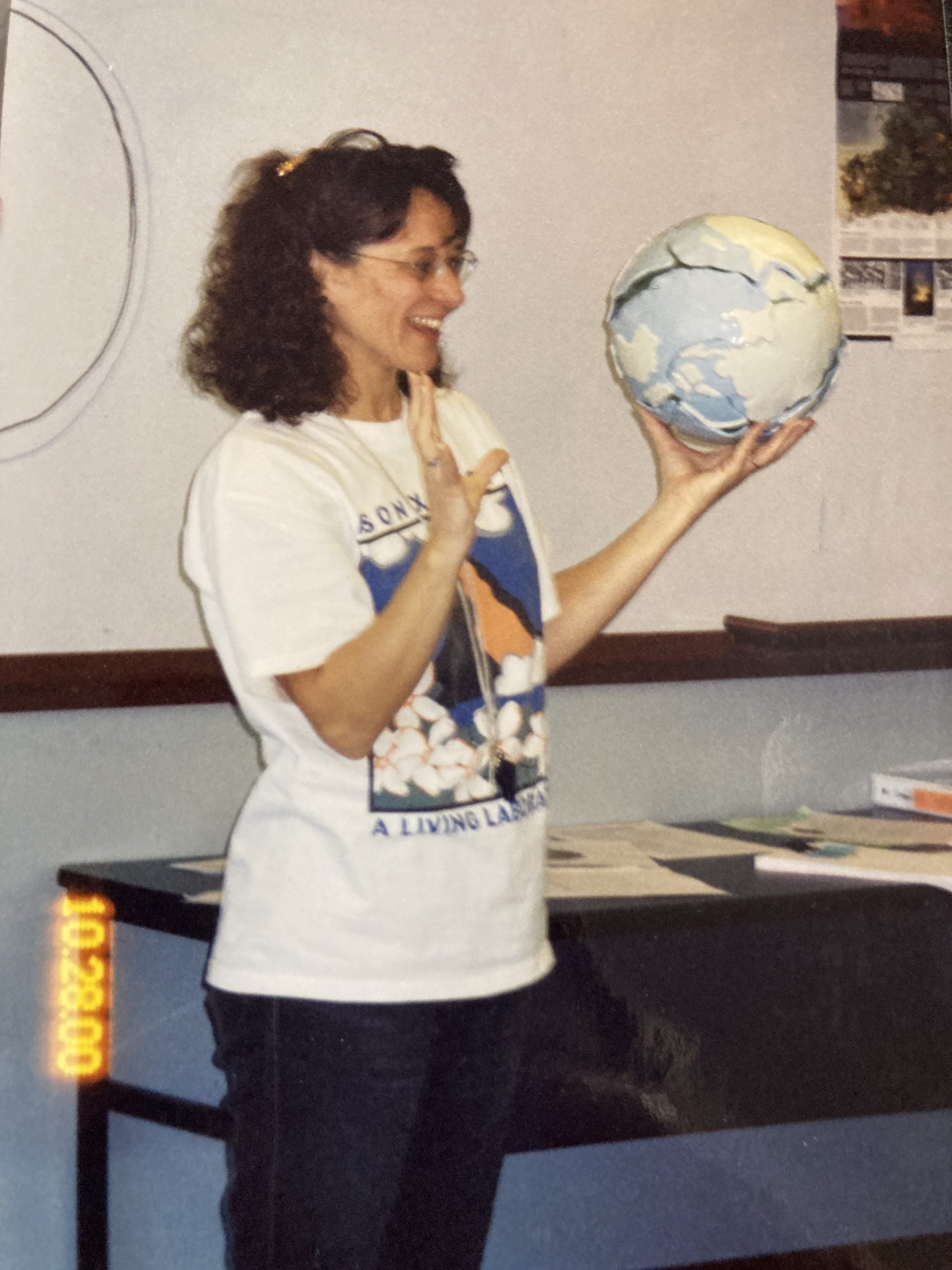Welcome to the twenty-first in our continuing series: GSO Profiles. Each post will feature a brief interview with a member of the GSO community. These profiles are one way we highlight the hard work of our community members.
Maryann C. Scholl is part of the GSO Public Engagement team, and over her 22 years at GSO she has managed numerous marine education programs and countless events, growing the ocean literacy of children and adults across the United States. Maryann is retiring the end of this month and the GSO community wishes her the best.
Here’s Maryann in her own words:
GSOP: Tell us about the usual work you do at GSO
MCS: Of the many things I liked about my work at GSO, the best is that it was always changing in one way or another.
From 1999 (JASON X) to 2007 (JASON XVIII), I worked on hosting the Jason Project. We were the only site in Rhode Island to show the live broadcasts, which meant that each year we planned to welcome approximately 5,000 people to GSO during a two-week period.

I have coordinated the R.I. Teachers At Sea (RITAS) program from when it started in 2004. In addition to meeting and working with the RI school teachers, I have enjoyed working with the people who make the RITAS program a success: the R/V Endeavor crew, the ship’s marine technicians, the Marine Operations team, and Professor David Smith and all of the principal investigators that have graciously allowed an educator to ‘tag’ along during a research cruise. We all have been rewarded by the extremely complimentary exit comments made by the participants who have been so full of praise for the program.
Sometime in the early 2000 I was asked to take on the Narragansett Bay Classroom programs, which turned out to be personally very rewarding. Not only did I get the opportunity to help hundreds of K-12 students and members of the public learn more about marine science, I also felt honored to work with some amazing GSO graduate students who presented these programs. Enlightening our next generation of oceanographers, marine educators and policy makers has been the major goal of this program.
Interspersed among these long-term responsibilities, I was involved with short-term projects such as organizing and participating in lectures, workshops, the South Ferry Historical Talk and Walk and staffing the Bay Campus Bookstore. My favorite among these was the South Ferry Historical Talk and Walk.
Starting around 1996 former URI professor, Wayne Durfee and his wife Bernice have graciously given two free, open to the public lectures each summer on the history of the land that GSO is now occupying. After a 45-minute in-door lecture they would then take the participants on a 45-minute walk around campus pointing out and explaining prominent features of the campus that we see every day but possibly may not have known why they are there, for example the rock jetty from the beach that was part of the ferry landing, military bunkers on campus, remnants of a house foundation from the once thriving village of South Ferry, etc.
GSOP: Tell us in general how your work at GSO changed due to the COVID situation and also tell us about changes during the time when most people worked remotely due to the COVID situation.

MCS: Have you ever heard someone say, “something good comes out of every bad situation?” My work changed quite a bit during the COVID situation/pandemic/work-from-home months, and to my surprise good outreach programs were developed during this time. I work with a great team in Public Engagement. We brainstormed ideas to continue our outreach remotely and we developed several virtual programs that were well accepted and will most likely continue to be in our repertoire of offerings, even after this situation ceases to restrict us from personal interaction. Sadly, there is one event that has remained in limbo since the COVID situation began, the South Ferry Historic Talk and Walk.
GSOP: What is your favorite thing about your work?
MCS: I work on several annual projects dispersed throughout the year, but in between my work is always changing.
GSOP: What led you to this type of work?
MCS: My desire to work with people, have different responsibilities and to continue learning.

GSOP: What brought you to GSO?
MCS: I volunteered to help with a JASON program. I was so impressed with the culture of the campus that I stayed.
GSOP: Who have been your role models or mentors?
MCS: I have learned much from many people at GSO, but the person who I learned the most from was Sara Hickox. Sara was the director I worked with at the Office of Marine Programs (now called Public Engagement) for over 15 years, her commitment to GSO and her ability to overcome obstacles were admirable.
GSOP: What do you do for fun?
MCS: Before or after I became a grandparent? Life has changed a bit since grandchildren have arrived but that has only added to the fun outside of work. I still travel as much as possible. I have too many hobbies: photography, gardening, hiking, and biking, on bad weather days there is always a sewing, knitting, or crocheting project waiting to be completed. Plus, I am always willing to try a new activity, there is much to look forward to doing.
GSOP: What is your favorite spot or view at GSO?
MCS: I have so many, but one that I always stop at when passing by is the 3rd floor southern stairwell window in the CI Coastal Institute building. It overlooks the southern part of the GSO campus and the bay. Also, of course, the view that hits me in the morning as I drive to campus from the top of the hill on South Ferry Road.

GSOP: What will you miss most about GSO after you retire?
MCS: Without a doubt, the people, their smiling faces and the feeling of comradery!
GSOP: When do you retire and what are your plans in retirement?
MCS: I will be retiring at the end of January. My plans are to travel. So much to see, do and learn, so little time to do it all!

